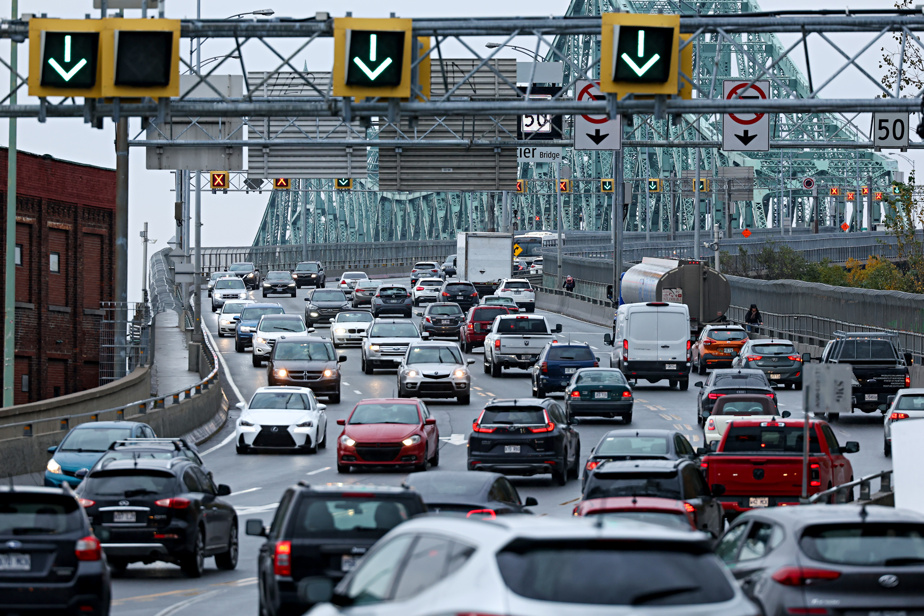It will now be more advantageous to carpool than to rely on public transit in Greater Montreal. The Regional Metropolitan Transport Authority (ARTM) is launching an 18-month pilot project on Thursday that will allow passengers to pay less than if they took the bus and will remunerate drivers.
The ARTM announced Thursday to launch a new application to promote carpooling as part of the repair of the Louis-Hippolyte-La Fontaine tunnel. Passengers will have to pay $0.12 per kilometer and drivers will be able to receive up to $0.54 per kilometer, if they pass through one of the four main links between Montreal and the South Shore.
Available in beta version on iOS and Android since this Thursday, the ARTM mobile application has been under development since 2020. Closed-circuit tests have also been taking place since last January. She will be available for 18 months initially, but could remain in office afterwards if all goes well.
The objective is in particular to relieve congestion in the area of the La Fontaine tunnel megasite, which is forcing the closure of three lanes out of six until 2025. Citizens from all over the region will be able to participate, however, so both those from the north and south rims and the residents of the island of Montreal.
Using a PayPal account, the driver who picks up a passenger and uses one of the four interriver axes – the La Fontaine tunnel or the Jacques-Cartier, Samuel-De Champlain and Victoria bridges – will receive $0.34 per kilometer . With two passengers, he will earn $0.44 and with three, $0.54.
Without using the four nerve centers, the driver will however receive much less, namely $0.10 for one passenger, $0.20 for two passengers and $0.30 for three passengers. The passenger will have to pay $0.12 for each kilometer traveled via the application, regardless of the route.
The ARTM will currently authorize a maximum of two trips per day for the driver. She hopes to “fight against solo driving” on the main thoroughfares, says her spokesperson, Simon Charbonneau.
In short, carpooling will cost less, most of the time, than public transit, according to the calculations of La Presse. Thus, to get to downtown Montreal, a person leaving Longueuil will pay an average of $1.09 with the app, compared to $4.50 for a public transit ticket. From Sainte-Julie, carpooling will cost $3.41, compared to $6.50 for a bus trip. Coming from Saint-Hyacinthe, it will be about $7.29 compared to $9.25 by public transit.
As the drivers will receive more than what the passenger fees will bring in, the shortfall will be absorbed by the budget envelope for the repair of the tunnel, of approximately 2.5 billion. To prevent passengers from being unable to find a car to return home, three “guaranteed returns” will be offered to passengers per year, if canceled with four hours or less notice. The ARTM will then donate a maximum amount of $55 to get home by taxi or public transit.
“This is a first in Canada, carpooling compensation. It is also the first time that the ARTM has moved forward on the side of carpooling. We really invite people alone in their car to think about it. This is a minimum decrease of 10 under the kilometer. It’s very interesting,” says Mr. Charbonneau.
He recommends users to “start the experiment with neighbors near your origin, or colleagues going to the same work destination”. “We see it a bit like a sociological experiment,” the spokesperson continues. The application is a tool, we want to see the appropriation that people will make of it. »
The ARTM makes no secret that one of the goals of this new application is to “collect evidence” for another major project: its Digital Mobility Program. This is an application that would bring together all mobility services, such as BIXI, Communauto, the metro, the bus, the taxi and carpooling, but which would allow you to pay only once a month according to its use.
This is the essence of the principle of “Mobility as a service” (MaaS), which is of interest to several transport companies around the world today. “The pilot project will be very useful to learn more about the opportunities and potential of carpooling in a project that will lead to the creation of a one-stop service offer in sustainable mobility in the metropolitan area and elsewhere in Quebec”, says General Manager Benoit Gendron on this subject.
Ottawa-based company RideShark was commissioned to develop the urban carpooling mobile application unveiled today by the ARTM. On its website, RideShark claims that “500 companies worldwide are effectively using” its already active app “to encourage and support sustainable travel for employees, students and the general public”.

